In terms of the global job market, candidates are increasingly choosing Canada. Thanks to the active labour market, an open and diverse environment, it is populated by people from all over the world. And if you plan to work in Canada, there are important categories of work visas and employment permits to consider.
The first step in entering the Canadian working environment is to secure the relevant permits for your line of work; however, getting such permits independently can be rather difficult at times.
Understanding Employment Permits
Subject to certain conditions, for a certain time-limited period, foreign workers are legally permitted to work in Canada provided that they have an employment permit. The employment permit application process must be completed if you intend to work in Canada. This often starts out with an offer of employment within a business in Canada.
Based on your job, you may also need a Labour Market Impact Assessment to confirm that there is a demand for whatever you bring to the table. The process also has two brief procedures: submitting an application through Immigration Refugees and Citizenship Canada (IRCC) and meeting essential admissibility criteria, which are the medical and security clearances. Once you have the paperwork ready, you can commence your employment journey in Canada.
Types of Work Visas
For foreign workers, Canada provides two main categories of work permits: open work permits and job-specific work permits. Both forms of work permits are meant to be temporary.
Every work permit has its validity period, and foreigners can work in the country for up to four years, collectively or successively. After that, they are allowed to come back only after they have lived in another country for at least four years.
The employer you can work for, the kind of job you can do, and how long you can stay in Canada to work will all be specified in your work visa. You are required to leave Canada at the conclusion of this period.
- Job-Specific Permits
Most work permits in Canada are employment or sector-specific, or they are linked to a specific employer. Only the employer may submit an application for a work-specific permit. The employee will need to apply for a new job-specific permit if they wish to work in Canada for a different employer.
Generally, the employer must file for an LMIA to ensure that there are no qualified Canadians or residents in the nation to fill the position. A positive LMIA is required for an application to be evaluated for approval. A copy of the positive LMIA notice and an actual job offer from the employer are required to get a job-specific work permit.
- Open Work Permits
Open work permits let their holders work in most jobs that are available in Canada because they are not employer or job-specific. A legitimate job offer or an LMIA is not necessary for open work permits. Open work permits, however, are exclusively granted to individuals who pass the stringent eligibility standards. An open work permit can be available to you if you are:
- A recent graduate of some Canadian post-secondary educational institutes
- A Canadian spouse of a temporary foreign worker
- An applicant under specific immigration schemes seeking permanent residence
- A dependent relative of an applicant for permanent residence
How to Apply for a Work Visa in Canada
When applying for a work visa in Canada, the initial process involves ensuring you meet the set criteria. Mostly this entails obtaining a legal job offer from a business in Canada. After receiving your confirmation, provide additional documents like identification, documents which will state your qualification as well as your willingness to pay for accommodation. The next step is to complete an application online through the IRCC website. Fingerprints and picture information may also be required.
Follow the progress of your application after submission. Upon approval, your work permit will be issued upon your arrival in Canada. Learning how to apply for work visas expedites the procedure.
Requirements for Canadian Work Visas
The temporary work permit process will be the first thing you have to go through. Through the online Express Entry procedure, you can be qualified for a permanent work permit after one or more years. Federal Skilled Worker, Federal Skilled Trades, and Canadian Experience Class are the three skilled worker immigration programs that fall under the category of permanent work permits. Although each has different requirements, all Express Entry applications normally need to have the following information included as a first step:
- Travel documents or passport
- Report on the evaluation of educational credentials
- Results of language tests
- If appropriate, a formal job offer from a Canadian firm
- Evidence of professional experience
- Provincial nomination (if the professional has one)
- Police clearance
- Evidence of finances
Eligibility Criteria
Anybody wishing to work in any province in Canada is required by law to have a legitimate job offer from a Canadian company, be in good health and moral character, and give documentation of their qualifications and adequate finances. Also, the applicant must guarantee that their passport is current and free of criminal records to be granted a work permit for Canada.
Irrespective of the work permit you are applying for, the eligibility requirements you must meet include:
- Age, which must be below 45 years
- Valid job offer letter issued by a Canadian employer with a positive LMIA
- Minimum of 2 years of skilled work experience under NOC category of TEER Level 0, 1, 2, or 3
Special Cases: Employment in Canada For Foreigners
Looking for work in Canada for foreigners is something that includes distinct hurdles and opportunities. Certain industries or nationalities are the focus of certain work visas, and others require joining trade agreements such as NAFTA (formerly known as USMCA).
For example, the Comprehensive and Progressive Agreement for Trans-Pacific Partnership (CPTPP) and the Canada-European Union Comprehensive Economic and Trade Agreement (CETA) enable foreigners to work in Canada as these trade agreements eliminate several hurdles that workers from partner countries have to clear before they secure a visa to Canada.
Understanding Work Permit Duration
The work permit duration in Canada can change based on the employment contract and the kind of visa. The majority of temporary work visas are only granted for the length of the job offer, though they may be extended in exceptional circumstances.
An open work permit, for example, might be good for three years, but a post-graduation work permit is only good for as long as your study program is. To find out how long you can work in Canada, make sure you always refer to the work permit duration in Canada and the relevant standards.
Post-Application Steps
There are a few things you should do after submitting your application to ensure everything goes according to plan:
- Following up on your application: To monitor the progress of your application, use the IRCC’s web application.
- Show up prepared: If your application is approved, you will receive a work permit at the port of entry. Make sure you have the necessary paperwork to support your identification, employment, and financial stability.
FAQs about Employment Permits and Work Visas
Here are some frequently asked questions related to employment permits and work visas in Canada:
- How do I get a job permit in Canada?
A valid employment offer and proof of qualifications are among the necessary documents that must be sent with your application via the IRCC.
- How long does it usually take to process a Canada job visa application?
Although processing times might vary, they often take a few weeks to a few months, depending on your location and the type of work visa you want.
Conclusion
Those who want to take up a job in this country should be familiar with some of the laws concerning employment permits and work visas in Canada. Knowledge forms one of the vital components of an application, particularly regarding the eligibility aspect and the type of work visa to apply for.
If you have any questions concerning this process, you should consult a lawyer. Immigration lawyer Ronen Kurzfeld, with extensive experience, can help you address all your concerns and ensure that all the requirements are met for your application’s clearance.





